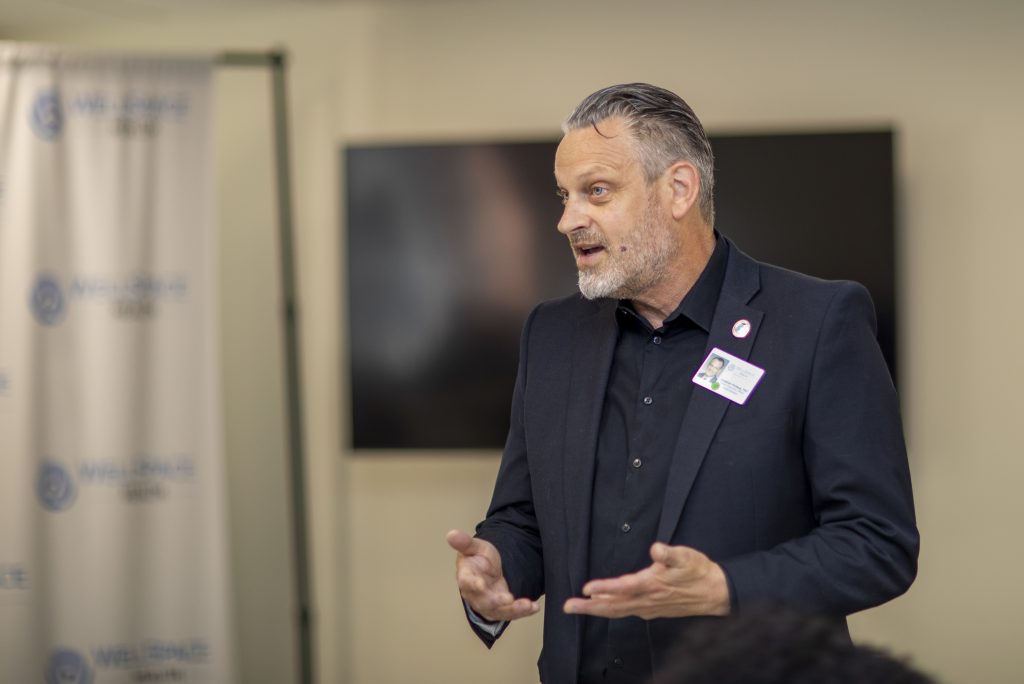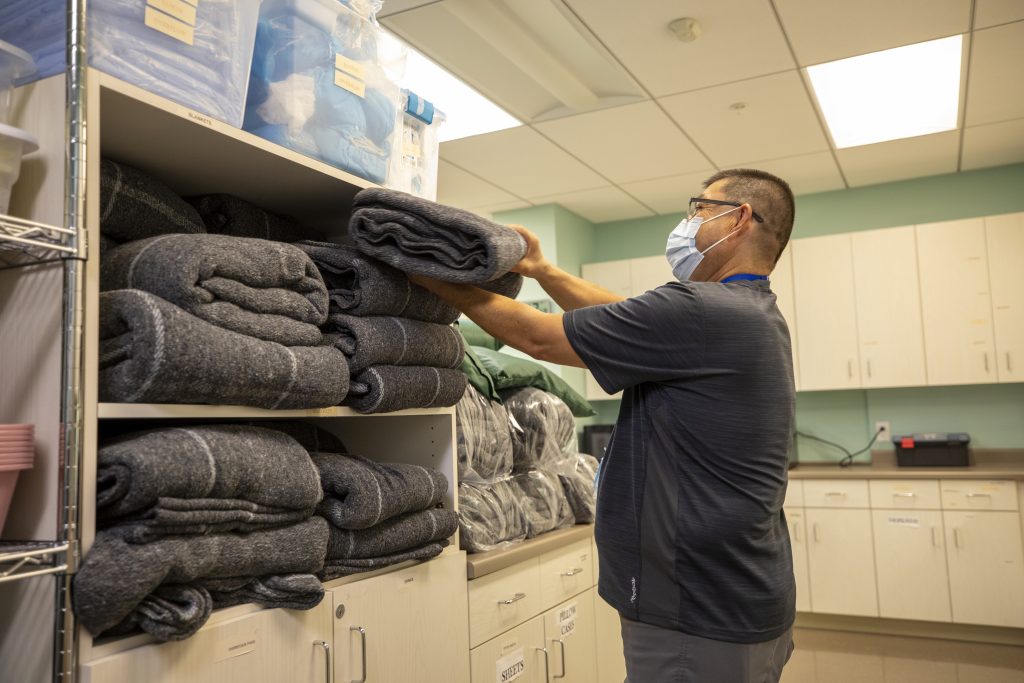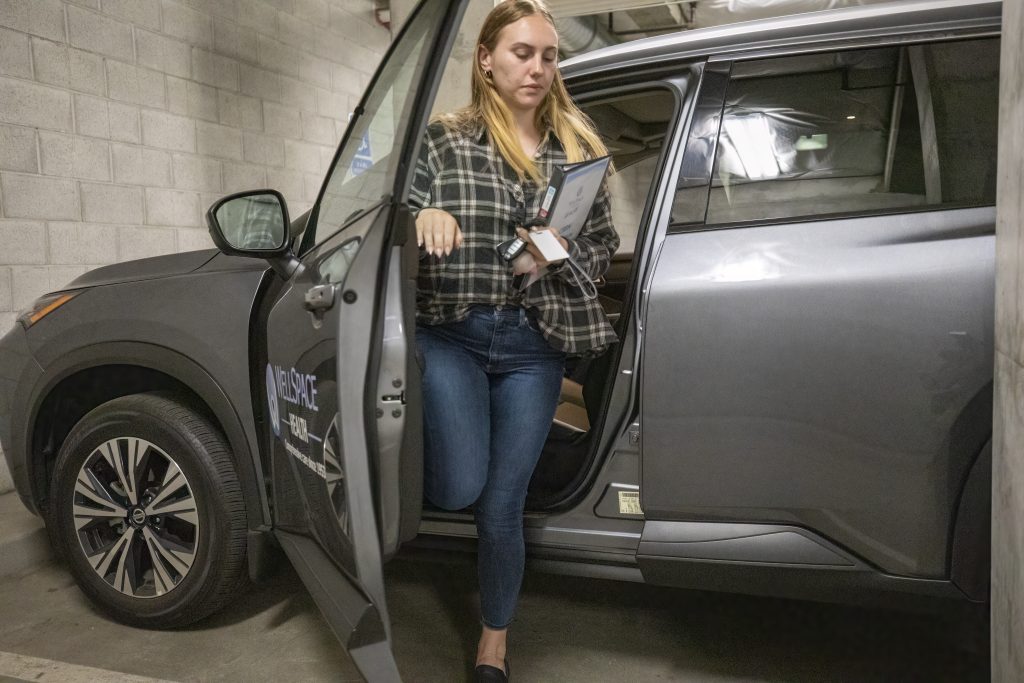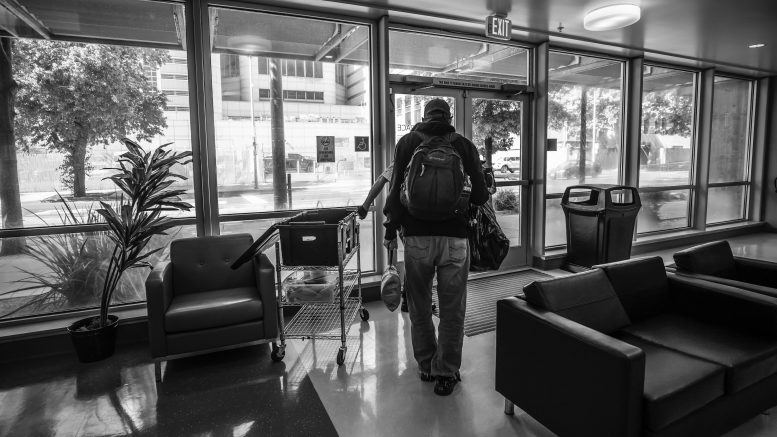By Steve Martarano
WellSpace Health CEO Jonathan Porteus was walking toward his organization’s 24-hour crisis receiving center at 7th and H streets in Sacramento when he encountered a Regional Transit officer heading out the door.
“I asked him what was going on,” Porteus, the CEO for 11 years, said about the recent encounter. “He goes, ‘Well, I just spent two minutes dropping a guy off.’”
A man was in the roadway under the 16th Street Bridge blocking traffic while possibly attempting suicide, Porteus said, and the RT officer and an ambulance had been called out. Once mobilized, the subject was asked if he wanted to go to the hospital or a crisis receiving site.
“He says, ‘Oh, I’ll take the crisis receiving site,'” Porteus said. “The ambulance was called off. If the ambulance had come, there’s only one place they can take someone and that’s the hospital. The RT officer spent three minutes driving him here, two minutes dropping him off, and left. He was very happy.”
This option wouldn’t have been available for local residents before 2020 when WellSpace’s Crisis Receiving for Behavioral Health (CRBH) program, aka “Crib,” debuted during the chaotic summer of COVID-19 lockdowns and civil unrest in Sacramento and across the nation in the wake of the police murder of George Floyd in Minnesota.

The program provides the choice of transporting patients within the Sacramento County service area to and from CRBH by authorized law enforcement referral partners or by the program’s mobile response team’s two vehicles. CRBH, which doesn’t treat walk-in patients, allows up to 24 hours for subjects to voluntarily recuperate from a mental health crisis or substance intoxication on site. More than 80% of patients at CRBH are experiencing homelessness.
“They [responders] love it because they pick people up and say, ‘Hey, I’m taking you somewhere safe,’” Porteus said, noting that only 4% of the patients CRBH receives end up going to the hospital or emergency room. “It’s not a fight. We have a detox facility, so we can get someone into detox right away. We have a rehab facility. We have outpatient counseling. Someone comes in, we’re moving them somewhere.”
In response to ‘terrible times of friction’

WellSpace Health is a nonprofit organization with around 1,130 staff members at 36 locations in Sacramento, Placer and Amador counties. The organization provides comprehensive medical, dental, behavioral health, and supportive services, including a suicide hotline, and Street Nurse and Substance Use Respite Engagement programs, to more than 110,000 low-income and underserved patients each year.
Once a subject arrives at CRBH, medically monitored services are provided, including a bed or reclining chair, water, light snacks, shower and a bathroom. At least five staff members are always on site, offering substance use disorder counseling, mental health assistance, case management and peer support, with space for up to 25 patients at a time, said Christie Gonzales, WellSpace’s program director.
“Twenty (patients) is our standard, but we can flex up the beds,” said Gonzales. “Folks might stay with us for four to six hours, and we may have multiple people in a bed during the day.”
CRBH was started at the request of law enforcement, Porteus said, after some “terrible times of friction” such as the 2018 police shooting death of Stephon Clark in a backyard of a house in the Meadowview neighborhood of Sacramento that received national attention.
“Stephon Clark was truly in crisis; he needed a crisis receiving site,” Porteus said. “Law enforcement didn’t have that in their holster. They had a taser; they had a pistol, but they didn’t have a crisis receiving site.”
Porteus said that law enforcement has needed a “way to deal with people who were intoxicated or psychotic.”
Gonzales said that during the first 18 months of the program, CRBH treated 2,500 patients, with daily average visits consistently rising since opening. The clinic experienced a surge of admissions of fans taken there during the Sacramento Kings’ recent playoff run, she said.
“A lot of the businesses in DOCO [Downtown Commons] and along K Street have our phone number,” Gonzales said. “I think more and more businesses and community-based organizations and law enforcement agencies are not only learning about us, but they’re seeing the ease for the drop off and being able to connect folks on the back end. There’s a trust and an ease there that has built our reputation.”
Creating a comprehensive crisis system

Legislation helped pave the way for CRBH. Bipartisan federal legislation passed in 2020 established a new 988 national phone line for suicide prevention and mental health and substance use disorder crises. That 998 line went into effect in 2022.
Then, Assembly Bill 988, authored by Assemblymember Rebecca Bauer-Kahan (D-Orinda) and signed by California Gov. Gavin Newsom in October 2021, provided the funding and a framework for the long-term implementation of the 988 crisis services continuum.
“Gov. Newsom wanted us to start building a crisis response system,” Porteus said. “We’re not just creating a 988 system, we’re creating a whole crisis system.”
Sacramento Police Department’s Linda Matthew, a police officer for 25 years who has contracted with Regional Transit for the last two years, has taken subjects to the WellSpace Substance Use Respite Engagement (SURE) program, which was a substance-based referral program that was replaced by CRBH.
“All the employees are super helpful,” Matthew said. “I’ve kind of built a relationship with a few of them myself, just constantly going there. … I think it’s a good thing that we have.”
WellSpace has occupied the 7th and H street location since 2012, Porteus said, which was modified in 2020 to become the CRBH site.
WellSpace recently purchased a 13-acre abandoned office park on Stockton Boulevard for $13.2 million, with multiyear plans to spend $120 million to complete the campus project. CRBH is scheduled to be one of the first WellSpace offices to move into one of the buildings, which should happen by the end of the year, Porteus said.
This story is part of the Solving Sacramento journalism collaborative. Solving Sacramento is supported by funding from the James Irvine Foundation and Solutions Journalism Network. Our partners include California Groundbreakers, Capital Public Radio, Outword, Russian America Media, Sacramento Business Journal, Sacramento News & Review, Sacramento Observer and Univision 19.



Be the first to comment on "WellSpace’s ‘Crib’ program provides temporary alternative to hospital or jail for Sacramento’s unhoused people in crisis"